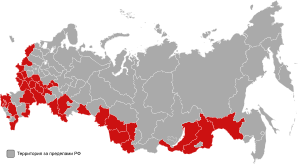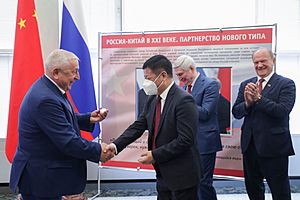Gennady Zyuganov facts for kids
Quick facts for kids
Gennady Zyuganov
MP
|
|
|---|---|
| Геннадий Зюганов | |
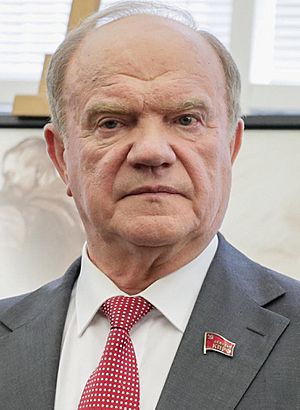
Zyuganov in 2022
|
|
| Chair of the Union of Communist Parties | |
| Assumed office 22 January 2001 |
|
| Preceded by | Oleg Shenin |
| General Secretary of the Communist Party of the Russian Federation | |
| Assumed office 14 February 1993 |
|
| Preceded by | Valentin Kuptsov |
| Member of the State Duma | |
| Assumed office 11 January 1994 |
|
| Personal details | |
| Born | 26 June 1944 Mymrino, RSFSR, USSR |
| Political party | |
| Spouse | Nadezhda Vitalyevna |
| Children |
|
| Relatives | Leonid Zyuganov (grandson) |
| Education |
|
| Awards | |
| Signature | |
| Military service | |
| Allegiance | |
| Branch/service | Soviet Army |
| Years of service | 1963–1966 |
| Rank | Colonel |
Gennady Andreyevich Zyuganov (Russian: Генна́дий Андре́евич Зюга́нов; born 26 June 1944) is a Russian politician. He has been the leader of the Communist Party of the Russian Federation (CPRF) since 1993. He has also been a member of the State Duma, which is like Russia's parliament, since 1993. Zyuganov has run for President of Russia four times. He is also the Chair of the Union of Communist Parties – Communist Party of the Soviet Union (UCP-CPSU) since 2001.
Contents
Early Life and Education
Gennady Zyuganov was born in Mymrino, a small farming village in Russia, on June 26, 1944. His parents and grandparents were all schoolteachers. He decided to follow in their footsteps. His father fought in World War II and came home with serious injuries. After finishing high school, Zyuganov worked as a physics teacher for one year in 1961.
In 1962, he started studying physics and mathematics at the Oryol Pedagogical Institute. From 1963 to 1966, he served in the Soviet Army. He was part of a special unit that dealt with radiation, chemical, and biological intelligence. In 1966, he joined the Communist Party.
He returned to college in 1966 and finished his degree in 1969. He was a few years older than most students and was already a party member and a good athlete. After returning, he married his wife, Nadezhda.
Political Career in the Soviet Union
Zyuganov first taught mathematics but soon started working for the Communist Party in his home region, Oryol Oblast, in 1967. He became the top leader of the local Komsomol, which was a youth organization of the Communist Party. He also became the regional chief for ideas and public information. He was known as a popular politician in the area.
He went to an important party school in Moscow, called the Academy of Social Sciences, in 1978. He earned a high-level degree there in 1980. After that, he returned to Oryol to lead the party's ideology and propaganda efforts until 1983. In 1983, he moved to Moscow for a senior role in the Communist Party's propaganda department.
Zyuganov became a strong critic of Soviet leader Mikhail Gorbachev's new policies, known as perestroika (restructuring) and glasnost (openness). He believed these reforms would weaken the party. As the Communist Party started to break apart in the late 1980s, Zyuganov supported those who wanted to keep the old ways. These reforms eventually led to the end of the Communist Party's rule and the dissolution of the Soviet Union.
Leading the Communist Party of the Russian Federation
In the early 1990s, Zyuganov wrote several important papers. These papers criticized Boris Yeltsin, who was then the leader of Russia. Zyuganov called for Russia to return to the socialist ideas that were common before Gorbachev's reforms. In July 1991, he signed a statement called "A Word to the People".
As the Communist Party of the Soviet Union fell apart, Zyuganov helped create the new Communist Party of the Russian Federation (CPRF). He became one of its main leaders. In 1993, he became the chairman of the CPRF. Many people were surprised that a Communist Party could still exist after the Soviet Union ended.
Zyuganov became the main opposition leader in Russia after the Soviet Union. He argued that the end of the Soviet Union made life harder for many people. He said that a small number of people gained most of the wealth. He also pointed out that crime increased and that different ethnic groups in Russia started to seek more independence, sometimes leading to violence.
Many Russians who felt left behind by the changes supported Zyuganov. This included workers, office staff, government employees, and older people. Zyuganov successfully combined Communist ideas with Russian nationalism. His new Communist Party joined forces with other groups, creating a "national-patriotic alliance." In the parliamentary elections of 1993 and 1995, the CPRF did very well. Zyuganov became a serious challenger to President Yeltsin.
1996 Presidential Campaign
Zyuganov ran for president in the 1996 Russian presidential election. He used ideas of Russian nationalism in his campaign. He criticized the influence of Western ideas in Russia. He said that Russia was a great nation that had been weakened from within by people who worked with Western capitalists. He claimed these capitalists wanted to break up Soviet power to use Russia's resources.
Some wealthy business leaders, known as oligarchs, were worried about the Communist Party gaining power again. They met and decided to work together to stop Zyuganov. They agreed to fund a campaign against him. This led to a large media effort with a lot of advertising and support from the media owned by these oligarchs. Many believe that these actions helped Yeltsin win the election.
In the election on June 16, Zyuganov came in second with 32% of the votes. Yeltsin received 35%. In the second round, Yeltsin won with 53.8% of the votes, while Zyuganov received 40.7%. Some people have suggested that Yeltsin might not have won fairly in 1996 and that there might have been problems with the election results.
After the 1996 Election
After the parliamentary elections in December 1999, the number of seats the Communist Party held in the Duma decreased. Support for the Communists began to decline. This was partly because many people supported the government's actions in Chechnya in 1999. Also, Yeltsin's new prime minister, Vladimir Putin, became very popular.
2000 Presidential Campaign
In the March 2000 presidential election, Zyuganov finished second, far behind Vladimir Putin.
After the 2000 Election
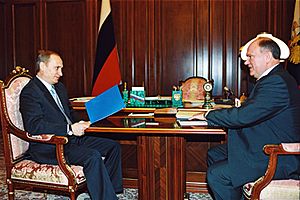
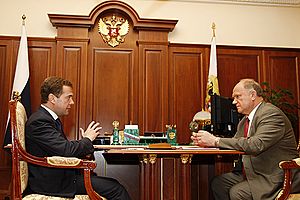
Since 2001, Zyuganov has also been the Chairman of the Union of Communist Parties – Communist Party of the Soviet Union (UCP-CPSU). In November 2001, Zyuganov wrote an open letter to President Putin. He said that Russia was not protecting its own interests by following US policies. He criticized Putin for closing a listening post in Cuba and a naval base in Vietnam. He also criticized Russia's support for the US using bases in former Soviet countries for its actions in Afghanistan.
In 2004, Zyuganov decided not to run against Putin. Putin then won the election by a large margin.
2008 Presidential Campaign
In October 2005, Zyuganov announced that he would run for president in 2008. He promised to greatly increase pensions and government salaries if he were elected. In the presidential election on March 2, 2008, Zyuganov received 17.76% of the votes. He came in second place, while Medvedev won with 70.23%.
After 2008
On Zyuganov's 65th birthday in June 2009, then-Prime Minister Vladimir Putin gave him a copy of the first Soviet edition of the Communist Manifesto. On December 21, 2010, the birthday of Soviet leader Joseph Stalin, Zyuganov called for Russia to return to some of Stalin's ideas.
After Putin's speech to parliament on April 20, 2011, Zyuganov criticized it. He said it did not do enough to fix Russia's economic problems. He warned that if the upcoming elections were not fair, the situation could become like the "Arab Spring" protests in North Africa. Zyuganov spoke out against problems in the 2011 Russian legislative election. However, he also disagreed with the organizers of the large protests in December 2011. He saw them as liberals who were taking advantage of the unrest.
The Communist Party played a small role in these protests. Their rallies in December 2011, protesting election issues, were attended by only a few thousand, mostly older, supporters. Some people questioned if Zyuganov, because of his age and connection to Soviet policies, could gain widespread support.
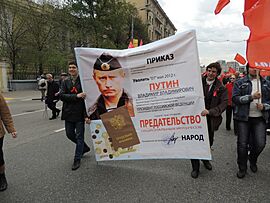
Zyuganov is a strong critic of President Vladimir Putin. However, he says his ideas for Russia's future are based on his Soviet background. Zyuganov hopes to bring all major industries back under government control. He believes the USSR was "the most humane state in human history."
The CPRF respects the rule of Joseph Stalin. Zyuganov and the party support traditional social values. They voted in favor of a law that banned promoting certain topics to minors.
2012 Presidential Campaign
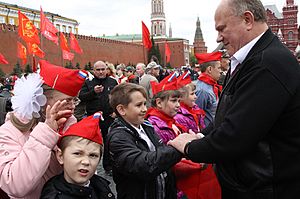
In September 2011, Zyuganov became the CPRF's candidate again for the 2012 presidential election. He said that "a group of people who only care about money and profit have shamed the country." He called for a new international alliance to "fight against the aggressive policies of powerful countries."
In the 2012 Russian presidential election on March 4, 2012, Zyuganov again came in second place. He received 17% of the votes.
Political Views
Zyuganov believes that Jesus Christ was the first communist. He claims that the Bible can be understood from a socialist point of view.
After Russia faced penalties for doping in sports before the 2018 Winter Olympics, Zyuganov suggested sending Russian fans to the Games with a Soviet Victory Banner. He is seen by some scholars as a supporter of "neo-Eurasianism," which is a political idea about Russia's place in the world.
In August 2022, Zyuganov stated that the Soviet leader Mikhail Gorbachev brought "absolute sadness, misfortune and problems" to the people of Russia.
Stance on Ukraine
Following the events in Ukraine in 2022, the CPRF released a statement supporting Russia's actions. The party accused NATO of planning to "enslave Ukraine" and creating "critical threats to the security of Russia." They called for Ukraine to be "demilitarized" and "denazified."
The party officially supported the idea that Ukraine was being governed by groups they called "neo-Nazis." They claimed these groups were harming Russian speakers in certain regions. They also said that Russian forces were liberating these people. The CPRF also accused the United States and NATO of sending people they called "fascist sympathizers" and "terrorists" to Ukraine to fight the Russian army.
Two members of the CPRF's Duma group, Vyacheslav Markhayev and Mikhail Matveev, expressed some disagreement with the conflict. However, they supported protecting the people in the Donbass region. Some younger members of the CPRF spoke publicly against the conflict. They called it "imperialist" and against the principles of Marxism–Leninism. In September 2022, Zyuganov called for a general mobilization in the State Duma.
Personal Life
Gennady Zyuganov's wife is Nadezhda Zyuganova (her maiden name was Amelicheva). She also graduated from the History Department of Oryol Pedagogical Institute. They have two children, a son named Andrey (born 1968) and a daughter named Tatyana (born 1974). They also have seven grandsons and one granddaughter.
Sanctions
In February 2022, Zyuganov was placed on sanctions lists by several countries. These included the United States, Canada, Japan, the United Kingdom, Australia, and the European Union. This happened because he voted in favor of actions related to Ukraine in 2022.
Electoral History
See also
 In Spanish: Guennadi Ziugánov para niños
In Spanish: Guennadi Ziugánov para niños
- Architect amidst the Ruins
- A Word to the People
 | Selma Burke |
 | Pauline Powell Burns |
 | Frederick J. Brown |
 | Robert Blackburn |


